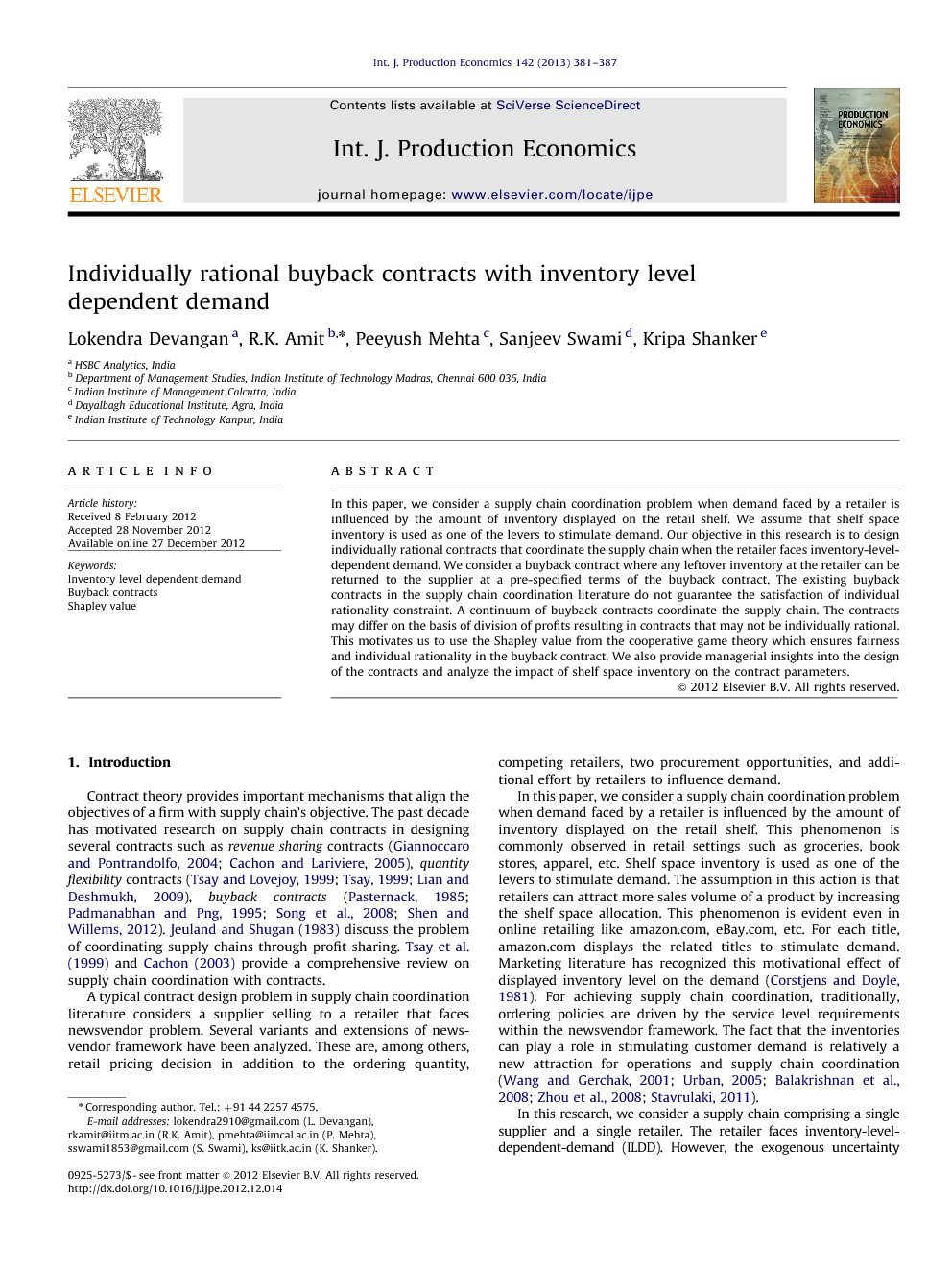Contract theory provides important mechanisms that align the objectives of a firm with supply chain's objective. The past decade has motivated research on supply chain contracts in designing several contracts such as revenue sharing contracts ( Giannoccaro and Pontrandolfo, 2004 and Cachon and Lariviere, 2005), quantity flexibility contracts ( Tsay and Lovejoy, 1999, Tsay, 1999 and Lian and Deshmukh, 2009), buyback contracts ( Pasternack, 1985, Padmanabhan and Png, 1995, Song et al., 2008 and Shen and Willems, 2012). Jeuland and Shugan (1983) discuss the problem of coordinating supply chains through profit sharing. Tsay et al. (1999) and Cachon (2003) provide a comprehensive review on supply chain coordination with contracts.
A typical contract design problem in supply chain coordination literature considers a supplier selling to a retailer that faces newsvendor problem. Several variants and extensions of newsvendor framework have been analyzed. These are, among others, retail pricing decision in addition to the ordering quantity, competing retailers, two procurement opportunities, and additional effort by retailers to influence demand.
In this paper, we consider a supply chain coordination problem when demand faced by a retailer is influenced by the amount of inventory displayed on the retail shelf. This phenomenon is commonly observed in retail settings such as groceries, book stores, apparel, etc. Shelf space inventory is used as one of the levers to stimulate demand. The assumption in this action is that retailers can attract more sales volume of a product by increasing the shelf space allocation. This phenomenon is evident even in online retailing like amazon.com, eBay.com, etc. For each title, amazon.com displays the related titles to stimulate demand. Marketing literature has recognized this motivational effect of displayed inventory level on the demand (Corstjens and Doyle, 1981). For achieving supply chain coordination, traditionally, ordering policies are driven by the service level requirements within the newsvendor framework. The fact that the inventories can play a role in stimulating customer demand is relatively a new attraction for operations and supply chain coordination (Wang and Gerchak, 2001, Urban, 2005, Balakrishnan et al., 2008, Zhou et al., 2008 and Stavrulaki, 2011).
In this research, we consider a supply chain comprising a single supplier and a single retailer. The retailer faces inventory-level-dependent-demand (ILDD). However, the exogenous uncertainty may still influence the demand. Hence, we model the demand faced by a retailer as a function of displayed inventory level and the exogenous uncertainty. First, by determining the performance of an integrated firm, we identify the set of optimal actions of the retailer and the supplier. Next, we provide arguments on lack of incentives for the firms to take optimal actions and the consequential inefficiencies in the supply chain.
Our objective in this research is to design individually rational contracts that coordinate the supply chain when the retailer faces inventory-level-dependent demand. We consider a buyback contract where any leftover inventory at the retailer can be returned to the supplier at some prespecified terms of the buyback contract. As elaborated later in the paper, in buyback contracts, the objective is to maximize the overall supply chain profits rather than emphasizing on the division of that profit. There may be combinations of wholesale and buyback prices that maximize the supply chain's profits; however, they may induce lower profits for a firm in the contract, compared to decentralized supply chain. The existing buyback contracts in the supply chain coordination literature do not guarantee the satisfaction of individual rationality constraint. A continuum of buyback contracts coordinate the supply chain. The contracts may differ on the basis of division of profits resulting in contracts that may not be individually rational ( Cachon and Terwiesch, 2009 and Lariviere, 1999). This motivates us to use the Shapley value from the cooperative game theory which ensures fairness and individual rationality in the buyback contract.
Our contribution in this research is to design individually rational buyback contracts that coordinate the supply chain when the retailer faces inventory-level-dependent demand. We also provide managerial insights into the design of the contract and the impact of shelf space inventory on the contract parameters.
In what follows, we first determine the performance of an integrated firm and contrast it with the performance of the decentralized decision making of supplier and the retailer. Section 3 describes the individually rational buyback contract when retailer faces inventory level dependent demand. We compute different combinations of wholesale and buyback prices that implement the Shapley value of the coordinated supply chain. The computational results to provide managerial insights are provided in Section 4. We conclude in Section 5.


